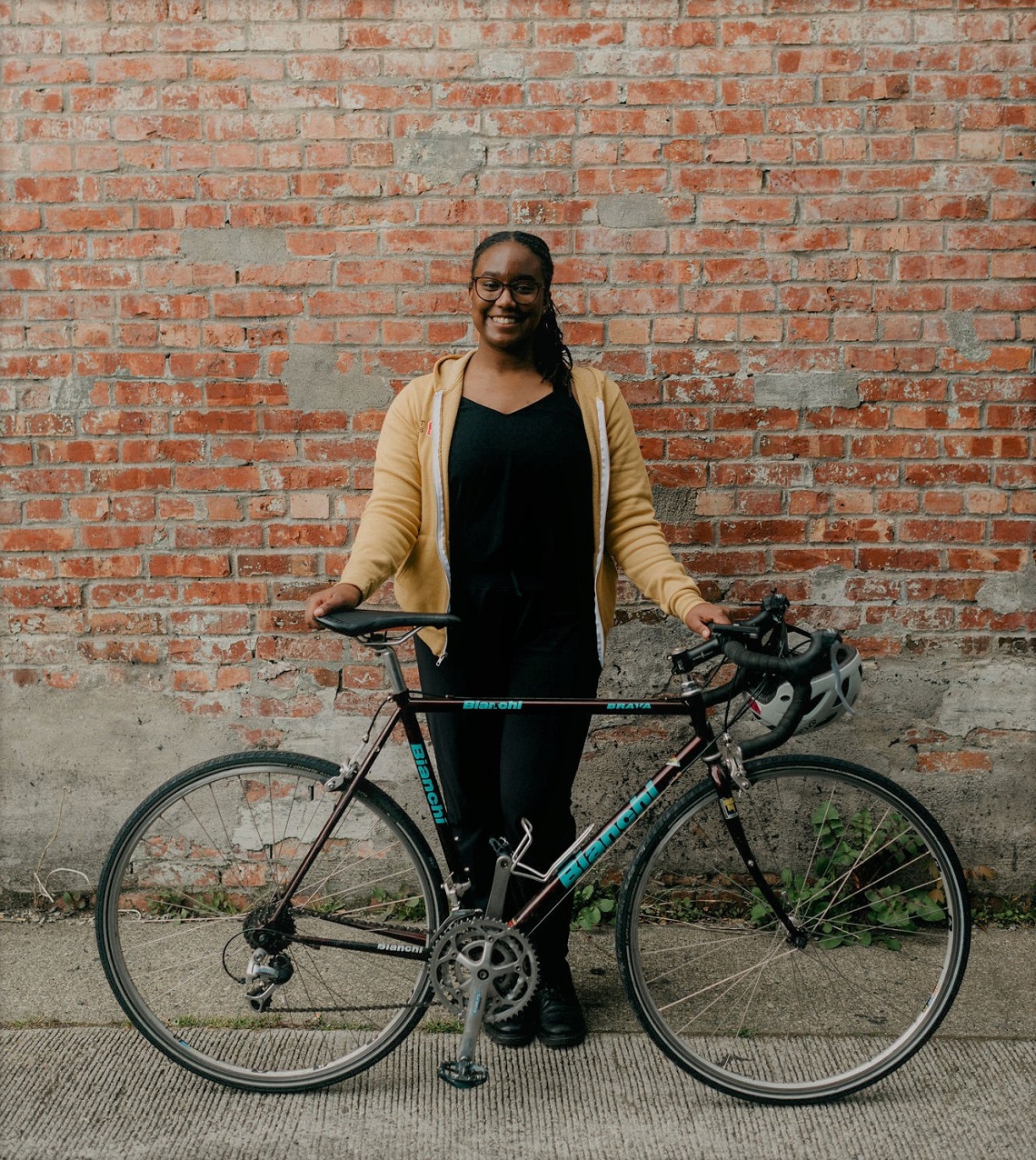Vehicle for Change
Khatsini Simani applies business acumen to expand access to the joy of cycling
As a cycling advocate, Khatsini Simani (BA 2019) speaks eloquently about topics such as the importance of safe cycling infrastructure and traffic reduction. But it is when she discusses the pleasure of cycling for its own sake that she especially comes alive.
“I’ve always loved biking,” she says. “There’s a joy just in bicycling itself. And it’s important to share that, especially with youth who may not see themselves represented in cycling, whether in media or in their physical environments.”
Simani serves as program director for the Seattle nonprofit Bike Works, which promotes the bicycle as a vehicle for change to empower youth and build resilient communities. Bike Works hosts summer camps, in-school programs, classes, bicycle repair services, community rides, and distributes free bicycles to those in need.
Bike Works has been a Seattle institution for more than 25 years, making a difference in the community in which Simani grew up. “I went to church down the street from Bike Works and always knew of them. So for me there is a lot of sentimental value here.”
A unique summer camp
Bike Works summer camp offerings this year included a program specifically designed for girls and non-binary youth who identify as Black, which Simani co-facilitated in partnership with Young Women Empowered.
“The goal of that camp was to create a welcoming environment for young people who shared this cultural experience,” says Simani. “In creating this camp we had to imagine a different space led by people who shared the participants’ backgrounds or experiences, and could also teach how to bike safely on the road. These spaces are ones that often need to be intentionally designed, because you don’t just happen upon them.”

Photo credit: Kae-Lin Wang
The camp was a success as measured by the most important metric: the participants had a great time, learned several skills and left with a positive experience of bicycling. “We didn’t center on racism or historical oppression,” Simani says. “We focused on having fun while riding, being present and aware of ourselves and our surroundings, and exploring the city multimodally. But the transformational part was the youth saw people who look like their potential future selves on a bike.”
The camp also provided a learning experience for Simani and colleagues, as they faced new challenges introducing cycling to a wide range of students. “We needed to intentionally make space for accessible ridership, whether that was physically, through the types of bikes we were providing, or the pacing of our rides,” she says. “We also focused on emotional wellness by checking in on participants throughout our trips, planning intermediate destinations so that the end wasn’t the primary focus, and cultivating a supportive environment.”
Wide-ranging role
As a program director at smaller nonprofit, Simani’s role defies a tidy job description, entailing everything from contributing to the organization’s vision to helping a child with a flat tire.
“I wear a lot of hats,” she says. “I meet with team members to understand the day-to-day of the programs they manage. We forecast and plan. There’s also some strategic direction in determining how we allocate our resources to best serve the community, as well as mentorship.”
Simani has extensive experience at nonprofits, including Seattle’s other major cycling organization, the Cascade Bicycle Club, where she served as an education program coordinator. It was her desire to bring additional skills to organizations aiding the community that brought her to the Foster School of Business.
“During my time at Cascade, I saw that non-profits used similar skills as business owners did,” she says. “I wanted to understand the language and operations of business, and the impact businesses have on communities.”
Empowered by Foster
Simani initially had some trepidation about attending a business school, and concerns about whether there would be a place for her in such a setting. “I had this perception of what business school was,” she admits. “It felt very inaccessible having attended community college and coming from a nonprofit.”
She credits the Undergraduate Diversity Services (UDS) office with helping her acclimate and says her participation in its programs was a highlight of her time at Foster.
“I became a tutor and mentored with the Young Executives of Color program. I found a community at UDS,” she says. “It was relaxed and felt very accessible. That helped me feel comfortable, and that I could be myself.”

Simani graduated with a degree in accounting, and a lucrative career at a big five accounting firm would have been an option. Instead, she demonstrated her commitment to assisting underrepresented communities, and opted to remain at Foster. She took a position first as an intern and then a full-time role at the Consulting and Business Development Center (CBDC). As an assistant director at CBDC she secured internships for students and professional development opportunities for business owners who were underrepresented in their industries.
Today, Simani utilizes the skills she learned at Foster to get more young people on and around bikes, promoting cycling as means of physical activity, freedom of mobility, connection and—just as importantly—having fun. She doesn’t view her work as a separate from the business world, but rather a part of the common ties that connect all communities.
“Businesses don’t operate in a vacuum,” she says. “I came out of Foster understanding that it’s not just nonprofit vs. for-profit. We all have to work together with our different values and incentives to try and solve the same problems.”
